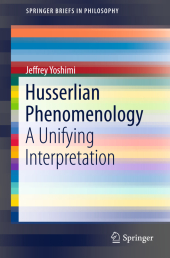 Neuerscheinungen 2016Stand: 2020-02-01 |
Schnellsuche
ISBN/Stichwort/Autor
|
Herderstraße 10
10625 Berlin
Tel.: 030 315 714 16
Fax 030 315 714 14
info@buchspektrum.de |

Jeffrey Yoshimi
Husserlian Phenomenology
A Unifying Interpretation
1st ed. 2016. 2016. viii, 91 S. 13 Farbabb. 235 mm
Verlag/Jahr: SPRINGER, BERLIN; SPRINGER INTERNATIONAL PUBLISHING 2016
ISBN: 3-319-26696-9 (3319266969)
Neue ISBN: 978-3-319-26696-1 (9783319266961)
Preis und Lieferzeit: Bitte klicken
This book unifies a large part of the vast body of Husserlian phenomenology using a relatively simple set of dynamical laws. The underlying idea of the book is that a certain core theory of "world-constitution" in Husserl can be formalized and presented in less than 100 pages, with the aid of detailed graphics and quantitative textual analysis. The book is the first to formalize so much of Husserl´s work in such a short space. It is both a contribution to Husserl scholarship, and a unique and accessible introduction to Husserlian phenomenology. By making key Husserlian ideas clear and by formally expressing them, it facilitates efforts to apply Husserlian phenomenology in various domains, in particular to cognitive science. The book thus prepares the way for a detailed point-by-point set of connections between Husserl´s phenomenology and contemporary cognitive science.
_Chapter 1: Introduction.- Chapter 2: The Basic Idea and Other Preliminaries.- Chapter 3: The Formalism.- Section 3.1: The Dynamical Systems Framework.- Section 3.2: Expectation Rule.- Section 3.3: Expected Visual Continuations and Trail Sets.- Section 3.4: Learning Rule.- Chapter 4: Textual Analysis.- Chapter 5: Intentionality.- Section 5.1: Intentionality in General.- Section 5.2: The Dynamics of Intentionality.- Chapter 6: Constitutive Phenomenology.- Section 6.1: Constitution in General.- Section 6.2: Constitution as Construction.- Section 6.3: Constitutive Phenomenology as a Research Program.- Chapter 7: Horizon Theory.- Section 7.1: Three senses of ´Horizon´.- Section 7.2: Horizon Dynamics.- Chapter 8: Motivation.- Section 8.1: Motivated Possibilities.- Section 8.2: Examples.- Section 8.3: Learning and Motivation.- Chapter 9: Genetic Phenomenology.- Chapter 10: Conclusion.- Section 10.1: The Unifying Interpretation.- Section 10.2: Other Constitutive Domains.- Section 10.3: Other Concepts in Husserlian phenomenology.- Section 10.4: Naturalized Phenomenology.- Section: 10.5 Other Applications.- Appendix: Search Method.- References
Jeff Yoshmi is an Associate Professor of philosophy and cognitive science at UC Merced. In 2004 he joined the Merced campus (which opened to undergraduates in 2005) as a founding faculty member, and subsequently helped build the cognitive and information sciences program in to a world class program. He does interdisciplinary work at the intersection of philosophy and cognitive science, drawing on Husserlian phenomenology, dynamical systems theory, and computer modeling and visualization. His overarching research project is to understand how the dynamics of consciousness are related to the dynamics of neural activity. He believes a formalized Husserlian phenomenology is key to this project.


